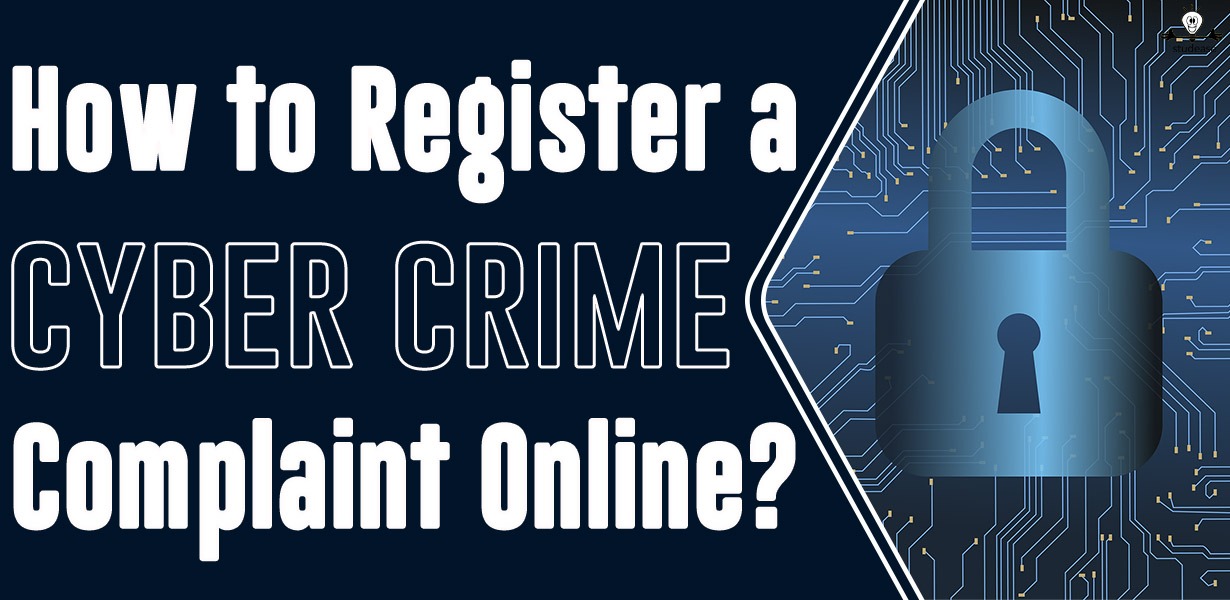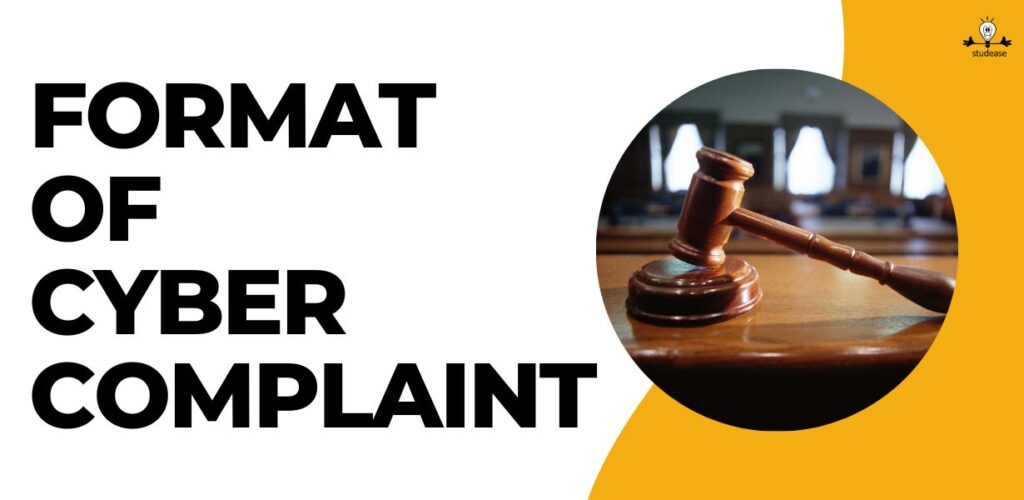How to Register a Cyber Crime Complaint Online: A Quick Guide

In today’s increasingly digital world, cyber crimes have become a major concern, affecting the lives of individuals and businesses alike. With the rapid evolution of technology and the internet, such offenses demand a proper reporting mechanism to ensure that victims receive timely assistance and justice.
In this regard, the Government of India has taken the initiative to establish a user-friendly platform for its citizens to report cyber crimes easily and efficiently.
The National Cyber Crime Reporting Portal has been designed primarily to cater to complaints related to cyber crimes. This accessible online system streamlines the process of filing a complaint and ensures that users receive the appropriate support from relevant authorities.
By understanding how to register a cyber crime complaint online in India, individuals can help law enforcement agencies in their fight against cybercriminals and foster a safer digital community.
Before diving into the process of registering a complaint, one must gather all pertinent information related to the cyber crime incident. Retaining evidence, such as screenshots, malicious emails, or messages, is crucial to support one’s claims and facilitate a thorough investigation by authorities.
By following the steps outlined on the National Cyber Crime Reporting Portal, individuals in India can feel empowered to take a stand against cyber criminals and protect their online security.
Also Check: Top 10 Rights of Arrested Person
What is Cyber Fraud?

Cyber fraud refers to fraudulent activities that are conducted using digital means, primarily through the internet. It can target individuals, organizations, or even government entities. These crimes are often financially motivated and can range from identity theft and online scams to more sophisticated cyber attacks.
One common form of cyber fraud in India is the phishing attack. These attacks involve deception to steal sensitive information such as usernames, passwords, or bank account details. Criminals employ various tactics, including impersonating legitimate organizations and using social engineering techniques to manipulate victims into revealing personal information.
Another prominent form of cyber fraud is the online financial scam. Fraudsters may send messages or emails, typically posing as banks or financial institutions, asking victims to provide sensitive account details or complete a fraudulent transaction. In some cases, online shopping can also lead to cyber fraud when victims make purchases at fake e-commerce websites designed to steal their payment details.
To register a cyber crime complaint in India, individuals can use the National Cyber Crime Reporting Portal. This initiative by the Government of India facilitates victims and complainants in reporting cyber crimes online, mainly focusing on cyber crimes against women and children.
It is crucial to report cyber fraud when it occurs, as this contributes to the authorities’ efforts in catching and prosecuting the criminals responsible for these acts. Furthermore, reporting such incidents can help raise awareness and promote preventive measures to minimize the risk of future cyber fraud incidents.
Cyber fraud is a growing threat in India, and it is essential for individuals to stay informed about the various types of cyber crimes and the best ways to protect themselves from becoming victims. By promptly reporting incidents to the appropriate authorities, individuals can play a role in making the internet a safer space for everyone.
Understanding Cyber Crimes
Cyber crimes are illegal activities committed using the internet or computer networks as a medium. As our reliance on technology grows, so does the prevalence of cyber crimes. In India, it is essential to know how to register a cyber crime complaint online to ensure that the wrongdoers are brought to justice and digital users can maintain their security.
Types of Cyber Crimes
Below are some common types of cyber crimes:
- Phishing: Deceptive emails or messages that trick users into providing sensitive information such as login credentials or credit card details.
- Hacking: Unauthorized access to a computer system, network or personal online accounts, often with malicious intent.
- Identity Theft: Stealing someone’s personal information to impersonate them or commit financial fraud.
- Cyberstalking: Harassing or threatening someone through persistent online communication.
- Data Breaches: Unauthorized access to sensitive information, which may be sold illegally or used for malicious purposes.
- Cyberbullying: Using electronic communication to intentionally harass, threaten or intimidate individuals, especially minors.
Also Check: Is Watching Porn a Crime in India?
Registering a Cyber Crime Complaint in India

In India, cyber crime complaints can be registered online through the following steps:
- Visit the National Cyber Crime Reporting Portal (https://cybercrime.gov.in).
- Click on “Report Crime related to Women/Child (Anonymously)” or “Report Other Cyber Crimes” based on the nature of the crime.
- You will be directed to a new page where you can choose the category of the crime, fill in the necessary details, and provide a brief description of the incident.
- After providing the necessary information, click on “Submit” to complete the registration process.
Once submitted, the cyber crime complaint will be reviewed and dealt with by the appropriate authorities. It is crucial to provide accurate and complete information when registering a cyber crime complaint in India to ensure an effective investigation and prompt resolution.
The Process of Registering a Cyber Crime Complaint Online
How to report cyber fraud
To register a cyber crime complaint online in India, visit the National Cyber Crime Reporting Portal at https://cybercrime.gov.in/ and select the “Report and Track” option. You will need to register using your name and a valid Indian mobile number.
Gathering Evidence
Before filing the complaint, gather as much evidence as possible related to the cybercrime incident. This may include screenshots, emails, chat logs, transaction records, and any other relevant information that can help support your claim.
Finding the Appropriate Authority
Cyber crimes in India come under global jurisdiction, which means they can be reported in any part of the country, irrespective of where the crime was initially committed. Therefore, it’s essential to find the appropriate authority, such as local police stations or designated cybercrime cells, to file the complaint.
Personal Information
When filing the complaint, you will be required to provide your personal information, such as your name, address, mobile number, and email address. Providing accurate and up-to-date information will ensure that the authorities can contact you if necessary.
Incident Details
In this section, you should provide detailed information about the cybercrime incident, including the nature of the crime, the impact on you, the date and time of the incident, and any known details about the perpetrator. Be as specific as possible in describing the incident.
Documents needed to file report for Cyber Crime
When filing a cybercrime complaint, make sure to include the following documents:
- A written complaint letter detailing the incident
- Copies of any relevant communication, such as emails, chat logs, or screenshots
- Transaction details, if any
- Any other supporting documents that may help with the investigation.
Supporting Documents
In addition to the primary documents mentioned above, it is helpful to provide additional supporting documents that can further substantiate your claim. These may include bank statements, photographs of the incident, or any other relevant information that can serve the purpose.
Post-Complaint Action
After registering a cyber crime complaint online, it’s essential to know the steps you can take to follow up on your complaint.
Tracking the Complaint Status
Once you have filed an online cyber crime complaint in India, you’ll receive a tracking number or reference number for your reported case. This number enables you to track the progress and status of your complaint using the National Cyber Crime Reporting Portal. Keep this reference number safe, as it will be required for all future communication regarding the case.
Visit the portal’s website and log in using your registered credentials. From the dashboard, you can access the ‘Status Tracking’ option, where you can enter your reference number to check the current status of your complaint. The portal will display information such as the current stage of the investigation, potential actions taken, and any updates from the authorities.
Communicating with Authorities
As the investigation progresses, you may be contacted by law enforcement authorities for additional information or clarifications related to your complaint. It’s crucial to provide accurate and timely responses to facilitate a smooth investigation. Keep records of all communication with the authorities and any evidence you’ve submitted to support your complaint.
Complying with Legal Procedures
As a complainant, you may be required to abide by specific legal procedures and obligations. Make sure to track the status of your complaint, communicate effectively with the authorities, and comply with legal procedures to ensure the best outcome for your case.
Preventive Measures
Online Security Tips
It is essential to prioritize online security to minimize the risk of falling victim to cyber crime. Here are a few guidelines one should adhere to ensure safety:
- Use strong and unique passwords for each of your online accounts.
- Frequently update software and devices to the latest versions.
- Enable two-factor authentication on critical online services like banking, email and social media.
- Regularly back up important data.
- Be cautious while clicking links and downloading attachments from unknown sources.
- Avoid using public Wi-Fi networks for sensitive tasks like online banking.
Reporting Suspicious Activities
In India, if someone encounters or suspects cyber crime, they can register an online complaint using the following methods:
- National Cyber Crime Reporting Portal: Visit the official portal (https://cybercrime.gov.in) to report cyber crime complaints in India. It allows users to report incidents related to child pornography, child sexual abuse material, or sexually explicit content involving women or children. The portal also permits the reporting of cybercrimes against individuals, property, or the government.
- Local Police Station: Cybercrime victims can also register a complaint by visiting their nearest police station. On receiving the complaint, the local police will initiate the necessary action.
- State Cyber Cells: In cases of more severe or high-profile cybercrimes, one can contact the state’s cyber crime investigation cell to report the incident directly.
Prompt reporting of suspicious activities can help authorities apprehend the perpetrators and mitigate the impact of cybercrime on the larger community.
Also check: Punjab Judiciary Exam 2023
Cyber Cells in India
Cyber cells in India are specialized units of the police department dedicated to handling cybercrime complaints. They have been created to address the growing concern of cybercrimes such as hacking, online harassment, financial fraud, and other cyber threats.
There are several cyber cells spread across different states of India, each with their own designated jurisdiction. Some prominent Cyber Cells in India are located in major cities like Delhi, Mumbai, Bengaluru, Kolkata, and Chennai. The central agency for addressing cybercrimes is the Indian Computer Emergency Response Team (CERT-In) under the Ministry of Electronics and Information Technology.
In addition to filing online complaints, you can also report the incident to your local police station. If the incident involves a significant financial loss or poses a serious threat, consider contacting the Cyber Cell in your state or city directly. Their contact details can usually be found on the official websites of respective state police departments.
The increasing prevalence of cybercrimes in India has led to the establishment of Cyber Cells across the country. These specialized units address various cybercrime complaints and work diligently to ensure the security of individuals and organizations in the online space.
Format of Cyber Cell Complaint

When registering a cybercrime complaint online in India, it is crucial to follow the correct format for a seamless process.
Begin the complaint with an appropriate subject, such as “Complaint regarding cybercrime incident.”
In the opening paragraph, briefly describe the nature of the cybercrime and mention the date, time, and location of the incident. Be concise and stick to the facts of the case without including personal opinions or emotions.
Next, provide specific details of the cybercrime in a structured way. You can use bullet points or a table format to organize the information, which may include:
- Type of cybercrime (e.g., hacking, phishing, online harassment)
- Details of the victim (such as name, age, contact details)
- Details of the suspected perpetrator (if known)
- Evidence supporting the claim (e.g., screenshots, email correspondence, URLs)
In the following paragraph, mention the steps taken to prevent further damage, such as changing passwords, blocking accounts, or reporting the incident to relevant authorities (e.g., social media platforms, banks).
It might be necessary to provide additional documents, depending on the type of cybercrime involved. These could include:
- Copy of the victim’s ID proof (e.g., Aadhaar card, PAN card)
- Copy of relevant email or chat conversations that show the cybercrime activity
- Any available information or screenshots related to the cybercriminal’s digital footprint
Finally, request the concerned authority to take appropriate action against the cybercriminal and ensure that stringent measures are implemented for preventing such incidents in the future. Close the complaint with the details of the complainant.
Provide the name, address, and contact number so that the authorities can reach out for further investigation or updates.
Keep in mind that the tone of the complaint should remain professional and focused on the facts. Avoid using aggressive or emotional language, and ensure that the information provided is accurate and relevant.
Also Check: Preparing for Civil Judge Interview: Expert Tips and Strategies
Internet Safety Tips
As cybercrime continues to rise in India, it’s essential for individuals to know about the online safety measures they can take to prevent becoming a victim. This section will briefly discuss some key tips to maintain internet safety.
Firstly, always be cautious while sharing information online. Do not share sensitive or personal information such as passwords, bank account details, or identification numbers on websites that appear suspicious or lack security features. Moreover, avoid using the same password for multiple sites and change passwords regularly to maintain higher security.
It’s equally important to keep your devices updated with the latest security software, web browsers, and operating systems. Regular updates help protect devices from vulnerabilities that may be exploited by cybercriminals. Ensure that you have antivirus software installed and that it is also up to date.
When connecting to the internet, avoid public Wi-Fi networks, as they are often not secure and can expose your information to cybercriminals. Always use a secure Wi-Fi connection or a virtual private network (VPN) to safeguard your data.
Be wary of phishing attempts and scams: malicious emails, text messages, or social media messages might try to entice you with offers or seemingly legitimate requests for information. Always verify the sender’s email address and think twice before clicking on links or downloading attachments.
Educate yourself and stay informed about the latest cyber threats and safety tips. This knowledge enables you to recognize potential dangers and take appropriate action.
Remember, should you become a victim of cybercrime in India, report the incident to the appropriate authorities by filing a complaint with the local police or the National Cyber Crime Reporting Portal. This not only helps track the culprits but also plays a role in improving internet safety and security for all online users.
Also Check:
Conclusion
To sum up, registering a cyber crime complaint online in India has become a more straightforward process than ever before. The Indian Government’s initiative to launch the Cyber Crime Portal allows citizens to file complaints related to cyber crimes easily and efficiently, with special focus on cases involving women and children.
Filing a complaint on this portal is a vital step to ensure that cyber criminals are stopped and brought to justice. This online process makes it more accessible for individuals who might not have the time or resources to visit a physical office to report a crime. Moreover, the online platform ensures quick dissemination of information to the appropriate authorities.
Remember, a well-documented and timely complaint can provide law enforcement agencies with crucial information that enables them to investigate and take action against the perpetrators immediately.
By raising awareness about the portal and encouraging people to use it, we can collectively contribute to a safer online environment and safeguard the interests of our society.
What Next?
Students are encouraged to prepare well and stay informed. For more Content, Join our Telegram group to stay updated.
Join: studease Telegram Channel
Follow us: instagram
Subscribe: studease Youtube Channel
Download studease App:







